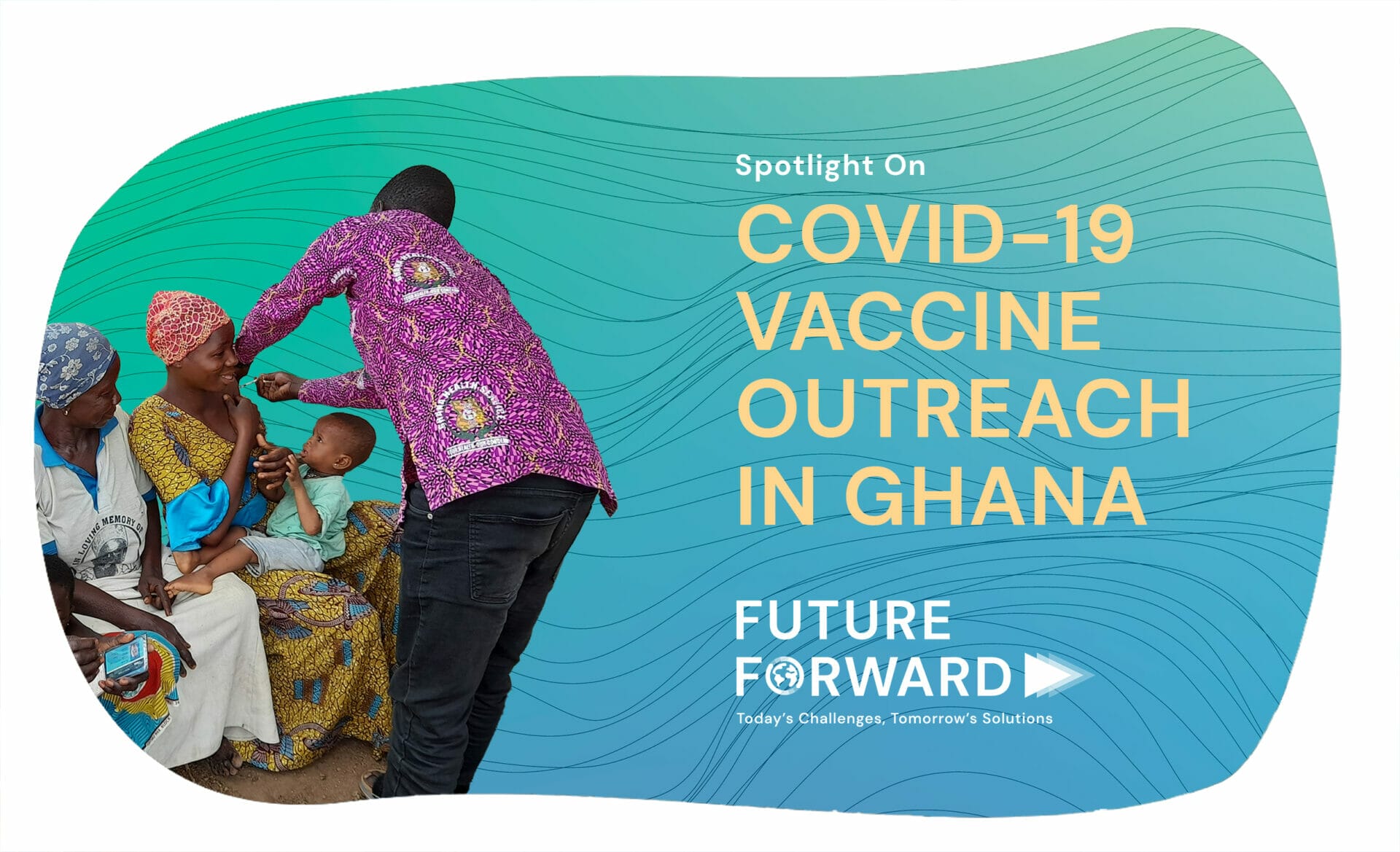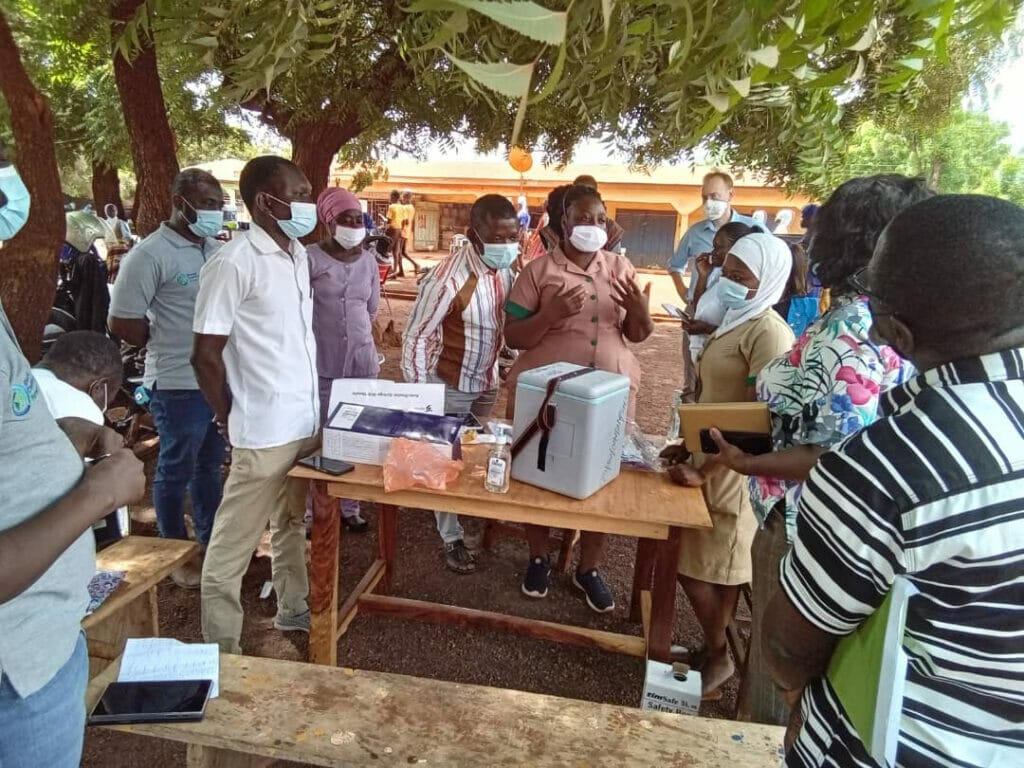News > Blog
Protecting Ghana from the Spread of COVID-19, One Community at a Time
Published 06/23/2022 by Global Communities

By Emefa Baidoo and Senam Ntow
Like many other countries in sub-Saharan Africa, Ghana was not prepared to respond to the COVID-19 pandemic. With a population of more than 31 million people and just one hospital bed per 1,000 individuals, its already overburdened health system and infrastructure nearly shattered.
In addition, urban-rural disparities continue for both safe water access and quality sanitation services in the West African country. Approximately 3 percent of health care facilities lack access to any water supply,1 and in northern Ghana, only 44 percent of households have improved water sources.2 While handwashing can help reduce the risk and spread of many illnesses, including COVID-19, fewer than 15 percent of Ghanaian households have appropriate facilities and soap.3
With support from the United States Agency for International Development (USAID), the government of Ghana and the Ghana Health Service (GHS) have responded to the COVID-19 pandemic through several interventions, including medicines for effective case management, the production of personal protective equipment, risk communication and mass population vaccinations.

Despite these efforts, however, vaccine uptake slowed recently due to a variety of factors, including resource constraints, widespread misconceptions, geographic barriers and sociocultural inhibitions, particularly in northern Ghana.
“I am afraid because people are saying when you take it, you will die within 6 months and may not be able to give birth again, even if you survive,” said Rosina Awafo, an 18-year-old from the Gorogo community in Ghana’s Upper East Region.
For 22-year-old Mercy Mbamana, who weaves baskets and mats for a living, vaccine hesitancy stems from a combination of financial insecurity and fear of becoming ill.
“I am always busy with my work,” she said. “I cannot risk staying at home for weeks because of sickness from the vaccination. What will I eat with my family if I don’t work?”
To help dispel these myths and reach people with limited access to vaccination services or those who are hesitant, GHS and USAID partnered with Global Communities to integrate COVID-19 support interventions into the Enhancing Water, Sanitation and Hygiene (E-WASH) Activity. E-WASH is a five-year project to facilitate access to and use of sustainable WASH services, products and practices in target districts of northern Ghana, namely within the Upper East, Upper West, Northeast, Northern, Savannah and Oti Regions.

As part of the project, Global Communities is providing implementation support and technical assistance to GHS at national, regional and local levels to rapidly accelerate the delivery of more than 5.8 million COVID-19 vaccinations in a safe, accessible and equitable manner. Over a six-month period (February – August 2022), the strategy is to meet people where they are – workplaces, markets, bus stops, sports stadiums, schools, religious venues and even at home.
“Global Communities strives for more people and their communities to have real access to vaccines against COVID-19,” said Emefa Baidoo, COVID-19 project lead for Global Communities Ghana. “Health care facilities are not readily available to all, especially in rural communities, and access to the vaccines could help them build some immunity.”
To overcome barriers in reaching populations who, because of social determinants or vaccine hesitancy, are less likely to become fully vaccinated, Global Communities has supported several social and behavior change communications activities, including the production and translation of a jingle in local dialects for broadcast on radio stations and through Community Information Centers and mobile van announcements. The song contains information about the benefits of taking the vaccine, where to get it and what to do before you are vaccinated.
Other strategies have included raising awareness about the pandemic, reinforcing basic prevention measures and increasing confidence in COVID-19 vaccines through home visits, meetings and information-sharing sessions at churches, mosques, schools and durbars, or formal community-wide gatherings. By directly engaging with religious, traditional and other public opinion leaders, listening to their concerns and answering questions they have about COVID-19, health promotion officers and other project staff have been able to dismantle misconceptions and raise demand for the vaccine among local communities.

“When [the vaccine] first came, a lot of pastors were preaching against it. … As a result, all of us were afraid of the jab, including my congregation,” said Joseph Nyaaba, a pastor from Bongo District in Upper East Region. “Engagements by Ghana Health Service on the misconceptions against the vaccine convinced me to take it. … The nurses came to my house, introduced themselves and why they had come to my house, and in less than five minutes, they vaccinated me.”
When asked how that visit changed his perception of the COVID-19 vaccine and how he addresses the subject now with his congregation, he replied: “I have realized that COVID-19 is real, and from the day I took my vaccine, I started encouraging my church members to also go for their jabs. I think after taking it and making it known publicly to them, I made some eager to also take it, especially those who took their first dose and did not want to take their second and booster doses.”
“I have realized that COVID-19 is real, and from the day I took my vaccine, I started encouraging my church members to also go for their jabs.”
Pastor Joseph Nyaaba, Bongo District, Upper East Region
In parts of the Oti Region, where fishing and religion dominate the culture, project volunteers don life jackets to cross Lake Volta and reach island communities with high resistance to taking the COVID-19 vaccine and limited access to health care.
On one such trip to Tokpo Island, the vaccination team met Harry Badenya, a young teacher with trypanophobia, an intense fear of needles. They sat with him for nearly an hour and carefully walked him through the process before Harry tightly closed his eyes to brace for the vaccination and said, “Is that all?”, when it was over – much to the delight of the group. He then told the team to “educate my students on the importance of taking the vaccine, who will, in turn, inform their parents.”
Health care workers have also learned it is helpful to share their own experiences with taking the COVID-19 vaccine to convince reluctant community members of its safety and effectiveness. Rosina, the young woman from Gorogo who initially expressed concerns about becoming gravely ill or dying from the vaccine, changed her mind and agreed to be vaccinated after learning more about potential side effects and examples of other locals who have remained healthy post-vaccination.

“We educated her on how safe and secure the vaccines are and used ourselves as examples,” said Katakyie Kesse-Tachi, Global Communities’ Upper East Regional Coordinator for the COVID-19 project. “We also used a known midwife in Gorogo, who took her jab two months ago and recently had a baby, as an example. This convinced Rosina and she willingly gave us permission to inject her.”
To date, in collaboration with GHS, Global Communities has reached more than 1.2 million people like Rosina, Harry and Pastor Joseph through mobile vaccination drives against COVID-19 in nearly all 64 target districts in northern Ghana.
Global Communities is also providing ongoing technical and logistical support for data entry, management and reporting into the Ghana District Health Information Management System. This will help standardize monitoring, evaluation and reporting efforts about the safety and effectiveness of Ghana’s COVID-19 vaccination program.
This content is part of Future Forward, a thought leadership and storytelling series on how Global Communities is driving change to save lives, advance equity and secure strong futures. To learn more, visit globalcommunities.org/futureforward.
[1] Ghana Institutional Framework for Water Provision, Aquaya, April 2020.
[2] Ghana Multiple Indicator Cluster Survey Report, 2017-2018 (latest).
[3] Interview: Ing. Worlanyo Siabi, Chief Executive of the Community Water and Sanitation Agency, 2018.



